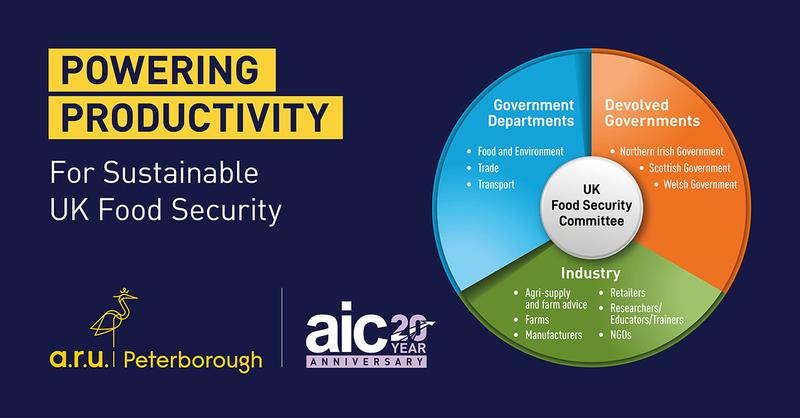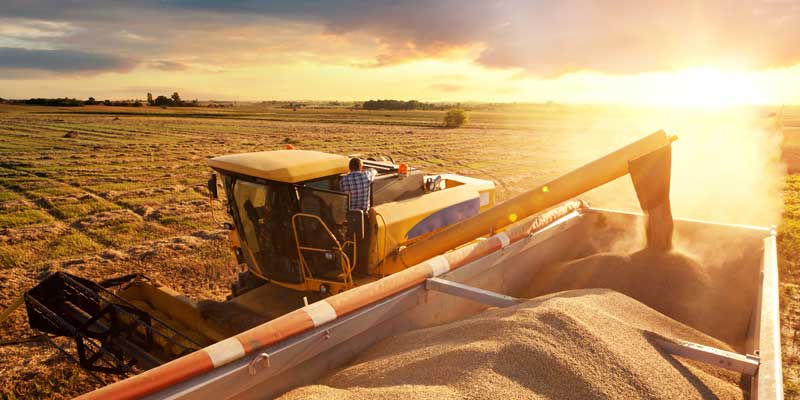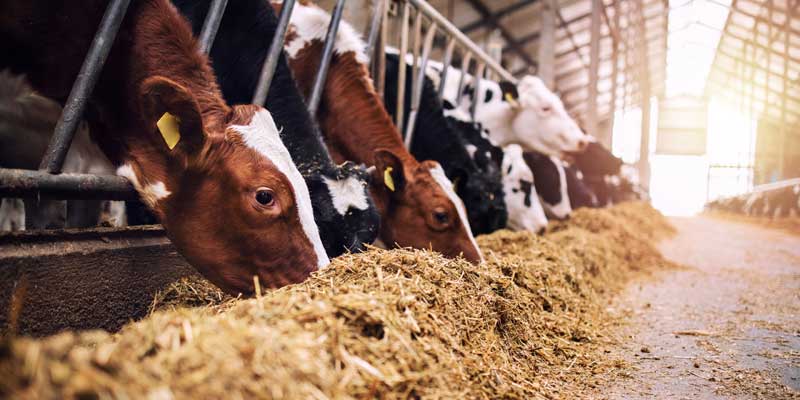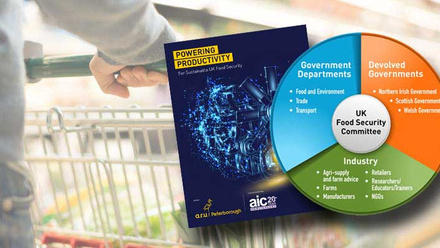Powering Productivity report: Executive Summary & Key Findings
Read the Executive Summary and Key Findings of the "Powering Productivity for Sustainable Food Security" report by Dr Marcus Bellett-Travers of Anglia Ruskin University, which was commissioned by the Agricultural Industries Confederation (AIC).
Recommendations for enhancing UK food security
The UK would benefit from the oversight provided by a statutory body established by government to operate independently beyond short-term parliamentary cycles.
This report therefore calls for the establishment of an independent UK Food Security Committee.

Such a body could advise the UK and devolved governments on national and strategic food security by taking account of the wide-ranging issues which determine agricultural productivity.
It is this productivity which fundamentally underpins the nation’s food security.
Summary of actions
The key findings of this independent report culminate in the following recommended actions to bolster the UK’s food security by enhancing agricultural productivity.
Land Use Strategy
Streamline government policies to create cross-departmental, comprehensive legislation that balances all facets of land management to ensure sustainable and secure food production.
Implement a government funding policy that maintains and improves sustainable food production within the UK while promoting dietary diversity.
Market Access
Expand both internal and external markets to enhance agri-food business resilience and food production security.
Technology, Data and Infrastructure
Encourage and legislate investment in technology, data solutions, and infrastructure to support sustainable business practices across the food supply system.
Research and Development
Promote interdisciplinary research to enhance the resilience, efficiency, and sustainability of production. Foster agricultural systems research that consolidates on-farm practices into transferable knowledge.
Training, Skills, and Advice
Develop training and education programs to equip the workforce with the skills needed for sustainable agricultural practices, including support for the proposed doctoral training centre for agricultural systems research.
Sustainability and Social Development
Support the development and adoption of sustainable practices in UK agriculture, encompassing social aspects.
Executive Summary
Agricultural production is a multifaceted process shaped by environmental factors, public opinion, food demand, economic forces, and government policies.
In 2021, the United Kingdom’s agri-food sector played a pivotal role in the nation’s economy, contributing an estimated £127 billion and providing employment to over 4 million individuals.
Agriculture itself, constituting 9% by value of this sector, boasted a workforce of almost 500,000. Agricultural supply businesses, represented by the Agricultural Industries Confederation (AIC), form the bedrock of the UK agri-food chain, supplying essential inputs and expertise to fuel agricultural production, and market cereals, oilseeds, and pulses.

A key trend is the rise of non-food agricultural production in the UK, encompassing bioenergy, biogas, textile, construction, and pharmaceutical products.
While this diversification enhances the viability of farming businesses, it intensifies the challenge to UK food security. Environmental policies and planning regulations are also increasing the pressure on food production in the UK.
Over the past two decades, the land area devoted to agricultural production has seen a modest decline of nearly 3% compared to 2002 (DEFRA, 2022a). In contrast, production has increased by 5% during the same period (DEFRA, 2022b).
Simultaneously, there has been a gradual dip in self-sufficiency, down by 3% for major crops, rendering the UK more reliant on imports from the EU (comprising roughly 50% of all imports) and other parts of the world (DEFRA, 2022b).

Climate change has brought about greater unpredictability into production in both the UK and globally, necessitating a shift towards decarbonising the agri-food supply chain and promoting sustainable farming practices.
The geo-political landscape has disrupted the security and dependability of the supply of goods. Therefore, ensuring the security of the UK’s food supply is more crucial than ever as part of a broader sustainability agenda.
This independent report lays bare UK agriculture’s hugely complex productivity picture, with readily competing and contradictory objectives and outcomes. Greater focus, direction, and co-ordination is needed.
A focus on achieving more predictable and reliable internal production and procurement is imperative to mitigate external supply chain shocks.
UK land use policy must harmonise with food security and broader agricultural output and sustainability.
However, focusing policy and legislation on land use and production decarbonisation alone risks centring UK production on a few “low-carbon crops”, increasing the need for imports and jeopardising food supply diversity.
Such a scenario could lead to a poorer diet for lower-income families and an increased burden on UK health services in the long term.

The UK Government should incentivise the decarbonisation of all farming and food system aspects, not just production and land management. The agri-supply industry is pivotal in this process and can be decarbonised rapidly with new investment.
Harnessing the innovation and technology benefits of decarbonisation requires collaboration among farmers, advisers, scientists, and educators to generate the information necessary for low-carbon alternatives.
A failure to do so could stall decarbonisation, exacerbate the UK’s skills gap, and impede the Government’s legally binding climate change commitments.
Prioritising soil, biodiversity, water, and air protection is essential, as these elements impose substantial hidden costs on UK taxpayers, including the provision of clean drinking water and clean air.

Maintaining the diversity of a nutritious diet produced domestically is crucial. This not only underpins a healthier population but also supports food supply security within the UK.
Sustainability and reliable productivity in the UK, rather than a sole focus on maximising yield, are vital. Circularity throughout the food supply chain is a fundamental aspect of decarbonisation.
Incentives that promote the reuse of food and other waste streams as farming inputs and alternative energy sources should be maintained and expanded.
Clarity and commitment to initiatives like renewable obligation certificates (ROCs) are critical to sustaining such circular processes.

The UK’s agri-food community - which includes agri-supply businesses, farmers, manufacturers, and retailers - must collaborate with the Government to equip the entire supply chain with the technology, skills, and support necessary for a truly sustainable industry.
Government incentives are required to spur stakeholder investments. Public awareness of the importance of a sustainable future, championed by the agri-food community, should be a part of broader engagement efforts to reconnect the UK public with food production and the environment it depends on.
Click below to find out more about the report and download a PDF copy.




